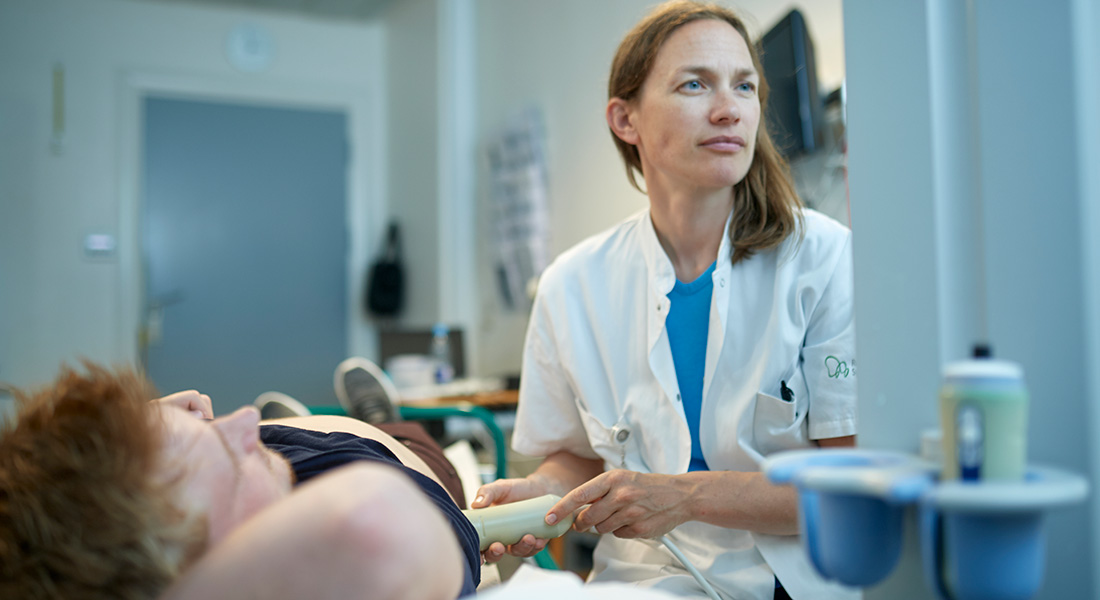Hansen Group secures DKK 15.6 million to improve the diagnosis of steatotic liver disease.
Applying omics technology and machine learning to blood samples could pave the way for earlier detection and precise treatment of steatotic liver – a disease that many people don't know they have. This is the goal of the project LOTUS-Biomarker, established by the Hansen Group, Odense University Hospital and healthtech company Evido, which has received DKK 15.6 million from Innovation Fund Denmark.

Arising from obesity, diabetes and alcohol, steatotic liver disease is a growing health challenge affecting around 1.5 million Danes, or 1 in 4 of the population. For some, the disease leads to cirrhosis and liver cancer, but it is currently impossible to identify the people with robust livers who can handle the disease and those with fragile livers who are most at risk.
A new research project, LOTUS-Biomarker, is now set to change that, thanks to a DKK 15.6 million kroner investment from Innovation Fund Denmark.
Cutting-edge technology creates the framework for tailored treatment
Omics technologies can identify thousands of different molecules in a single blood sample, which hold clues about a person’s disease state. However, doctors lack the tools to translate this enormous trove of information into actionable diagnoses.
LOTUS-Biomarker partners Odense University Hospital (OUH), the Novo Nordisk Foundation Center for Basic Metabolic Research at the University of Copenhagen and the healthtech company Evido have set out to address this challenge by developing the software solution, LiverTRACK.
LiverTRACK combines machine learning with omics technologies to provide a precise assessment of a person's risk of developing liver symptoms. LiverTRACK will also indicate whether individuals possess a particularly fragile or extra robust liver, and why. This allows for precision medicine solutions for the individual.
“We doctors have long wanted to be able to predict more precisely which people are at risk of developing serious liver disease later in life. By combining genetics with biological analyses of thousands of fats and proteins, we are beginning to understand the disease and its development. But the many test results will only benefit patients if the doctor has the tools to simplify what the tsunami of results means. Only then can we help patients tailor the treatment that will work best and thus save them from disease and suffering,” says project leader and professor Maja Thiele, from the Department of Medical Gastrointestinal Diseases, OUH.
"For several years, we have been working to understand how genetic variations affect the body's metabolism. By combining this knowledge with advanced measurements of proteins and fats, we can now identify biological patterns that were previously invisible. This brings us an important step closer to being able to predict disease and offer treatment that is targeted to the individual," says Professor Torben Hansen, Novo Nordisk Foundation Center for Basic Metabolic Research, University of Copenhagen.
“The lack of diagnostic solutions for early detection of hidden liver disease is a challenge that affects millions of people worldwide. This very issue is at the core of Evido's work, where we utilize existing blood sample data for accurate detection via accessible and scalable technology. That is why we are also deeply honored to be part of the LOTUS-Biomarker project and collaborate with two leading research centers to develop the next generation of liver diagnostics - for the benefit of both patients and the healthcare system, says Katrine Lindvig, Chief Scientific Officer and co-founder of Evido Health.
From research to clinical practice
The LOTUS-Biomarker project utilizes a large research database of more than six thousand people on Funen whose liver health has already been studied at the Odense University Hospital, Center for Liver Research. The existing research will be combined with new studies of those participants at highest risk of developing serious liver disease.
The support from Innovation Fund Denmark will enable the researchers to ensure that the LiverTRACK software is developed based on the highest quality standards to ensure patient safety and compliance with required EU regulations for medical devices, while complying with EU regulations for medical devices. The goal is that LiverTRACK can benefit the entire Danish healthcare system.
LOTUS-Biomarker places Denmark at the forefront of the development of precision medicine within liver research – and the expectation is that thousands of patients in the future will be able to receive faster and more effective treatment.
Facts
- Innovation Fund Denmark's investment: DKK 15.6 million.
- Total budget: DKK 20.8 million
- Duration: 5 years
- Official title: LOTUS: Longitudinal Omics Trajectories to Unravel Steatotic liver disease heterogeneity
About the partners
The Novo Nordisk Foundation Center for Basic Metabolic Research at the University of Copenhagen investigates how our genes and their proteins affect health and disease. Their research may lead to new methods for preventing and treating diseases.
Evido is a Health Tech company that develops clinical software and data models to detect liver disease based on blood test data.
